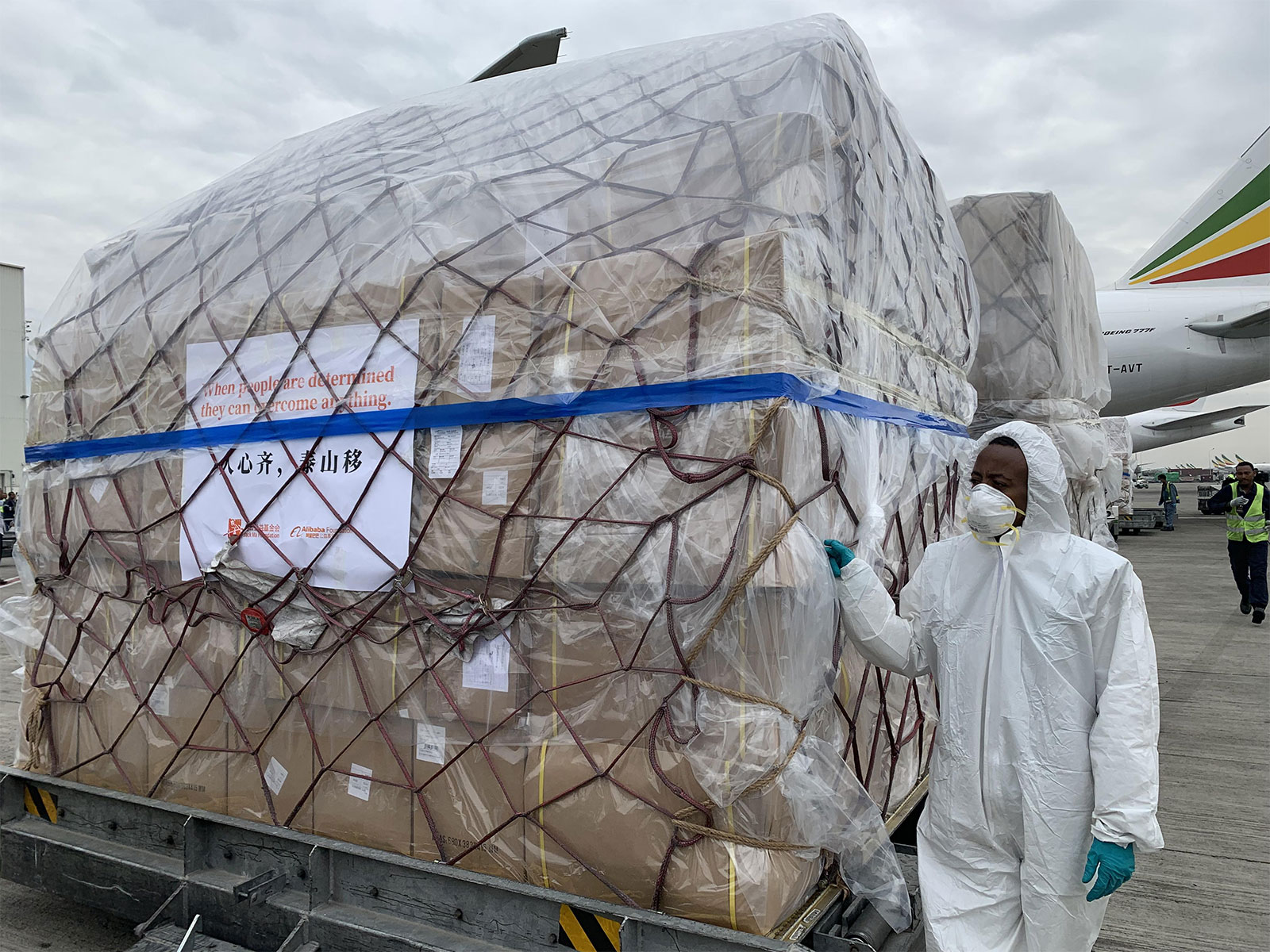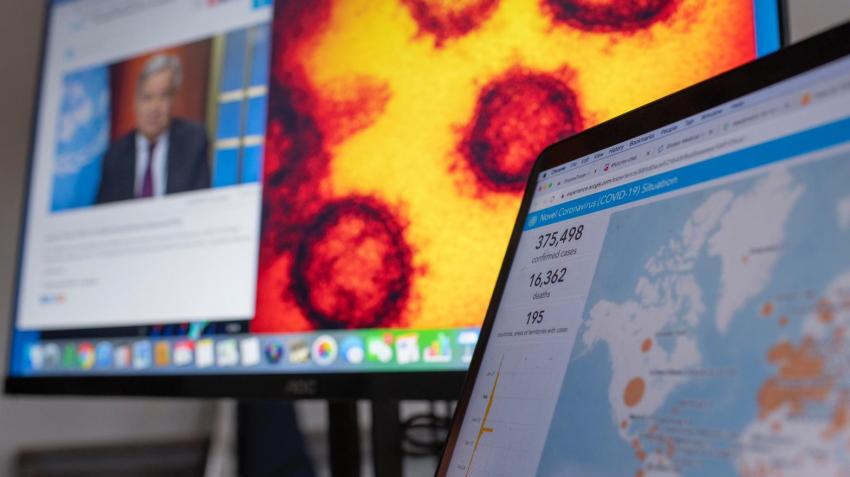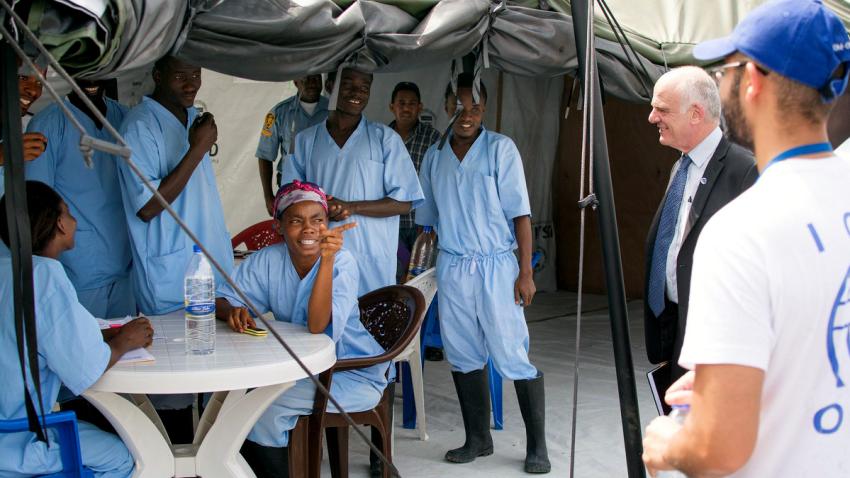25 March 2020 — The United Nations is calling for solidarity and increased funding, as some of the world’s most vulnerable countries scale up their efforts to combat the coronavirus pandemic.
“Now, the virus is arriving in countries already in the midst of humanitarian crises caused by conflicts, natural disasters and climate change,” said United Nations Secretary-General António Guterres as he, together with three senior officials, launched a $2 billion global humanitarian response plan to fund the fight against COVID-19 in the world’s poorest countries.
"These are places where people who have been forced to flee their homes because of bombs, violence or floods are living under plastic sheets in fields or crammed into refugee camps or informal settlements. They do not have homes in which to socially distance or self-isolate", he said.
It is a crucial part of winning this fight
Coordinated by the United Nations Office for the Coordination of Humanitarian Affairs (OCHA), this inter-agency plan brings together existing appeals from the World Health Organization and other UN partners, and identifies new needs as well.
#COVID19 is menacing the whole of humanity – and so the whole of humanity must fight back.
— United Nations (@UN) March 25, 2020
-- @antonioguterres at launch of Global Humanitarian Response Plan for #coronavirus. https://t.co/vusV9bnhSM pic.twitter.com/ftPtvRNI12
#COVID19 is menacing the whole of humanity – and so the whole of humanity must fight back.
— António Guterres (@antonioguterres) March 25, 2020
Today we are launching a $2 billion global humanitarian response plan to fund the fight against #coronavirus in the world’s most fragile countries.https://t.co/ygvnxjN85D pic.twitter.com/oq1mQoj0Lu
Properly funded, it will save many lives and arm humanitarian agencies and non-governmental organizations with laboratory supplies for testing, and with medical equipment to treat the sick while protecting health care workers. “It is a crucial part of winning this fight,” he emphasized.
Appeal for the Group of 20
On 26 March, the Secretary-General plans to attend a video conference of leaders from the Group of 20 major economies, in which he will ask them to adopt a “war-time” plan and step forward with strong response packages, which will address the outbreak domestically and help the poorer countries tackle the crisis.
“A recession is in prospect,” the UN chief said in a letter to the leaders of G-20, which accounts for 85 per cent of the world’s gross domestic product, adding that “the question is: how long it will last and how much damage will it do to the productive capacities of our economies and the livelihoods of our citizens.”
Three Key Areas for Action
The Secretary-General appealed to the G-20 to take bold action in three areas. First, he said that coordination and cooperation to suppress the virus is the first priority, calling on G-20 leaders to establish an articulated response mechanism guided by the World Health Organization, to achieve suppression together.
“We must create the conditions and mobilize the resources necessary to ensure that developing countries have equal opportunities to respond to this crisis in their communities and economies,” he said, stressing that “anything short of this commitment would lead to a pandemic of apocalyptic proportions affecting us all.”
The Secretary-General urged G-20 leaders to commit to ban tariffs, quotas or non-tariff measures, and remove restrictions on cross border trade that affect the deployment of medical equipment, medicines and other essential goods to fight the epidemic, also encouraging the waiving of sanctions imposed on countries to ensure access to food, essential health supplies, and COVID-19 medical support. “This is the time for solidarity not exclusion,” he stressed.
Second, he said, it is critical to minimize the social and economic impact of COVID-19 for everyone and stimulate a faster recovery everywhere, noting that by the end of this year, the cost of this pandemic is likely to be measured in the trillions of dollars.
“The response of G-20 leaders must be decisive and commensurate,” he said, calling for the urgent launch of a large-scale, coordinated stimulus package in the trillions of dollars to target the direct provision of resources to businesses, workers and households in those countries unable to do so alone. This would include scaling up cash transfer measures, social protection, tax abatement, fiscal stimulus, low interest rates, access to credit, insurance and wage support schemes.
Warning against protectionism, he urged the G-20 to play a critical role in helping developing countries cope with the crisis. So, the second support package needed is one of support to developing economies.
The G-20 can help provide immediate liquidity relief to the private and financial sector in the developing world in the form of trade credits, liquidity lines and guarantee schemes. Working with international financial institutions, the G-20 can help significantly increase access by developing countries to concessional financing. Third, he said, it is the common responsibility of all to “recover better”, with more inclusive and sustainable models of development. “The current crisis is a stark reminder of humanity’s common fate and of the need for upfront investments to reduce the catastrophic downstream risks of the pandemic,” Mr. Guterres said.
“I am convinced that only international coordination can avoid a worst-case scenario,” he said.
Global Financial Institutions
In a joint statement released today, the World Bank Group and the International Monetary Fund (IMF) called on all official bilateral creditors to suspend debt payments from borrowing countries that request forbearance. “It is imperative at this moment to provide a global sense of relief for developing countries as well as a strong signal to financial markets,” said the statement.

Earlier this month, the IMF said it is making available about $50 billion through its rapid-disbursing emergency financing facilities for low income and emerging market countries that could potentially seek support in their fight against the coronavirus.
The World Bank Group has also approved an increased $14 billion package of fast-track financing to assist companies and countries in their efforts to prevent, detect and respond to the rapid spread of COVID-19.
Private Sector
As the world’s largest corporate sustainability initiative, the United Nations Global Compact unites over 10,400 companies in 166 countries and is now encouraging businesses to support workers and take action on COVID-19.
Philanthropists

Philanthropists are also pitching in the fight against COVID-19. The foundation, created by Jack Ma, a United Nations advocate for sustainable development goals and the co-founder of Alibaba Group Holding, is donating protective masks and test kits around the world.
The Bill & Melinda Gates Foundation, Wellcome, and Mastercard partnered to contribute up to $125 million in seed funding to speed-up the response to the COVID-19 pandemic by identifying, assessing, developing, and scaling-up treatments.




